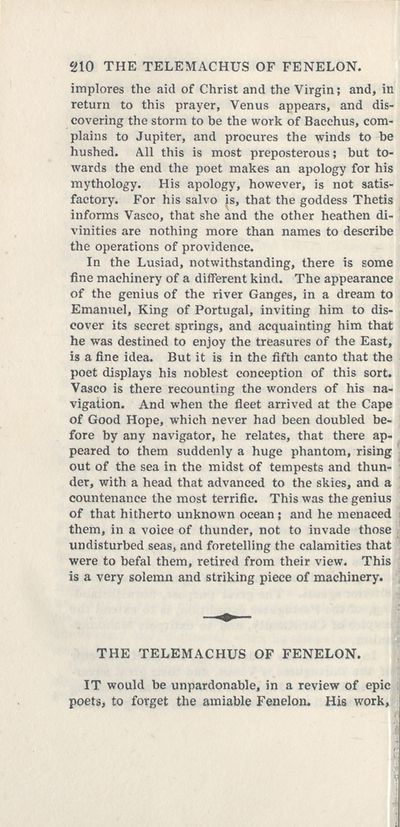Education > Essays on rhetoric
(238)
Download files
Complete book:
Individual page:
Thumbnail gallery: Grid view | List view

no THE TELEMACHUS OF FENELON.
implores the aid of Christ and the Virgin; and, in
return to this prayer, Venus appears, and dis¬
covering the storm to be the work of Bacchus, com¬
plains to Jupiter, and procures the winds to be
hushed. All this is most preposterous; but to¬
wards the end the poet makes an apology for his
mythology. His apology, however, is not satis¬
factory. For his salvo is, that the goddess Thetis
informs Vasco, that she and the other heathen di¬
vinities are nothing more than names to describe
the operations of providence.
In the Lusiad, notwithstanding, there is some
fine machinery of a different kind. The appearance
of the genius of the river Ganges, in a dream to
Emanuel, King of Portugal, inviting him to dis¬
cover its secret springs, and acquainting him that
he was destined to enjoy the treasures of the East,
is a fine idea. But it is in the fifth canto that the
poet displays his noblest conception of this sort.
Vasco is there recounting the wonders of his na¬
vigation. And when the fleet arrived at the Cape
of Good Hope, which never had been doubled be¬
fore by any navigator, he relates, that there ap¬
peared to them suddenly a huge phantom, rising
out of the sea in the midst of tempests and thun¬
der, with a head that advanced to the skies, and a
countenance the most terrific. This was the genius
of that hitherto unknown ocean ; and he menaced j
them, in a voice of thunder, not to invade those
undisturbed seas, and foretelling the calamities that
were to befal them, retired from their view. This
is a very solemn and striking piece of machinery.
THE TELEMACHUS OF FENELON.
IT would be unpardonable, in a review of epic
poets, to forget the amiable Fenelon. His work.
implores the aid of Christ and the Virgin; and, in
return to this prayer, Venus appears, and dis¬
covering the storm to be the work of Bacchus, com¬
plains to Jupiter, and procures the winds to be
hushed. All this is most preposterous; but to¬
wards the end the poet makes an apology for his
mythology. His apology, however, is not satis¬
factory. For his salvo is, that the goddess Thetis
informs Vasco, that she and the other heathen di¬
vinities are nothing more than names to describe
the operations of providence.
In the Lusiad, notwithstanding, there is some
fine machinery of a different kind. The appearance
of the genius of the river Ganges, in a dream to
Emanuel, King of Portugal, inviting him to dis¬
cover its secret springs, and acquainting him that
he was destined to enjoy the treasures of the East,
is a fine idea. But it is in the fifth canto that the
poet displays his noblest conception of this sort.
Vasco is there recounting the wonders of his na¬
vigation. And when the fleet arrived at the Cape
of Good Hope, which never had been doubled be¬
fore by any navigator, he relates, that there ap¬
peared to them suddenly a huge phantom, rising
out of the sea in the midst of tempests and thun¬
der, with a head that advanced to the skies, and a
countenance the most terrific. This was the genius
of that hitherto unknown ocean ; and he menaced j
them, in a voice of thunder, not to invade those
undisturbed seas, and foretelling the calamities that
were to befal them, retired from their view. This
is a very solemn and striking piece of machinery.
THE TELEMACHUS OF FENELON.
IT would be unpardonable, in a review of epic
poets, to forget the amiable Fenelon. His work.
Set display mode to:
![]() Universal Viewer |
Universal Viewer | ![]() Mirador |
Large image | Transcription
Mirador |
Large image | Transcription
| Antiquarian books of Scotland > Education > Essays on rhetoric > (238) |
|---|
| Permanent URL | https://digital.nls.uk/113762348 |
|---|
| Description | Thousands of printed books from the Antiquarian Books of Scotland collection which dates from 1641 to the 1980s. The collection consists of 14,800 books which were published in Scotland or have a Scottish connection, e.g. through the author, printer or owner. Subjects covered include sport, education, diseases, adventure, occupations, Jacobites, politics and religion. Among the 29 languages represented are English, Gaelic, Italian, French, Russian and Swedish. |
|---|

